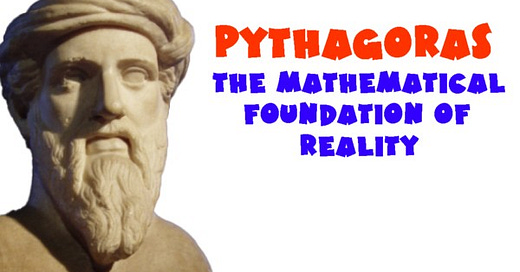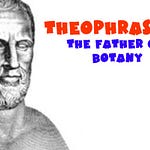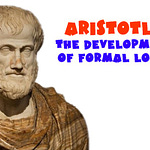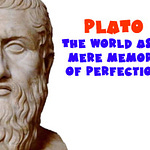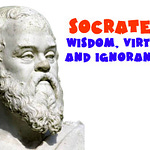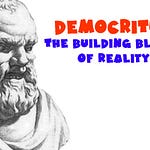Paid subscribers will have access to this and all other videos and bonus content. Please consider upgrading to a paid subscription to enjoy and support this project.
You can also obtain the benefits of a paid subscription by sharing Three Minute Philosophy with others. For each new friend you bring in, you earn benefits. So spread the word!
For the full archive of videos so far, visit https://www.speterdavis.com/philosophy/
Pythagoras of Samos was a Greek philosopher who lived around 570 BC and became one of the most influential philosophers of the classical Greek period, which might be surprising to you if you only know him as the triangle guy.
In actual fact, Pythagoras’ theorem – you know, that the square of the hypotenuse of a right angled triangle is equal to the sum of the squares of the remaining sides – is kind of a misnomer, because it’s unlikely that Pythagoras actually discovered that. But his reputation as the triangle guy isn’t actually far from the truth, because one thing we can really be sure about is that Pythagoras was really, really into triangles.
Pythagoras’ obsession was with mathematics. In his early days, he traveled around Europe and spent some time living in Egypt, which had a blossoming academic community, and it’s there that he’s said to have developed his fascination with math. Let’s be fair, if you spent 20 years staring at pyramids, you’d probably become obsessed with triangles too.
According to legend, Pythagoras didn’t really kick off his philosophical career until he was around 60 years old, at which point he settled down in the city of Croton in Italy, ranting about mathematics to anyone who would listen. As a result, Pythagoras was the first person to set up a school of philosophy, though in actual fact it wasn’t so much a ‘school’ as a ‘cult.’
If you’re into mathematics, then you might think you’re pretty nerdy, but at least you don’t worship math as a literal religion. Presumably. But the Pythagoreans, as they were known, believed that numbers were the building blocks of reality. And in some sense, they kind of are, but nowerdays even the most devout students of math are much less inclined to murder people who insult mathematics.
And by all accounts, the Pythagoreans were every bit as much of a crazy cult as Heaven’s Gate or Scientology. They thought that numbers were literally God – specifically, the number ten. In fact, the divine symbol of the Pythagoreans was the tetractys – ten points arranged in the pattern of a triangle.
What Pythagoras was working on here was an early form of the philosophical investigation of Ontology, which investigates the nature of reality. This encompasses questions about the physical world, starting with what it actually even means to say something is “real” and moving up from there.
You might assume that this is pretty easy question to answer. For example, you can say that horses exist but unicorns do not. Boom! Take that, philosophy!
But of course, there’s more to it than that. For example, do numbers exist? And if so, do they exist in the same way that horses exist? You might say that the number seven is real but the number twive is not. But what does that mean? Are either of them real, or are they just functions of language, or something else, or neither? Believe it or not, the ontology of numbers is something that philosophers grapple with to this day.
In this early stage of philosophical inquiry, philosophers were still kind of up in the air about what the fundamental unit, or “primary substance” of reality actually was. Thales of Miletus, who is usually cited as the first Greek philosopher, thought that the universe was fundamentally made out of water. Anaximenes believed that it was made out of air, and Heraclitus believed that it was made out of fire.
Pythagoras disagreed with all of them and believed that the world was made out of numbers, and that math was fundamentally the base unit of all reality. The Pythagoreans dedicated their lives to making mathematical discoveries, all of which Pythagoras himself was given personal credit for. For example, the fact that the sum of the angles in a triangle is equal to 180 degrees, as well as the concepts of square numbers and the whole idea of geometry.
Pretty much everything you learned in primary school mathematics can be traced back to something that Pythagoras, or more likely the followers of Pythagoras, discovered.
On top of that, it’s believed that the Pythagoreans were the first to work out that the Earth is a sphere, although many people today attribute that discovery to Christopher Columbus, because in today’s world, people find it hard to believe that knowledge existed before America.
Of course, no discussion about Pythagoras would be complete without mentioning the crazy details of his personality cult. It was said that the Pythagoreans weren’t allowed to eat beans, couldn’t touch a white chicken, couldn’t look in a mirror if it was beside a light, couldn’t cross a road, and couldn’t eat meat. Oddly enough, the primary sticking point seemed to be beans. For some reason, Pythagoras just really, really hated beans.
According to one legend, a Pythagorean student named Hippasus was the first person to discover what we now call irrational numbers, or numbers that can’t be expressed as a fraction. For example, if you try to apply Pythagoras’ theorem to a triangle where both straight sides equal one, you wind up with the square root of two, which is a number so insane that not even Pythagoras could wrap his head around it. Legend has it that Pythagoras was so incensed by this discovery that he had Hippasus killed.
Despite the fact that Pythagoras and his cult were pretty balls to the wall insane, they were one of the biggest inspirations on Plato, who later became one of the most important people in philosophy. So, a pretty major achievement for the triangle guy.
Sources:
Gorman, Peter., Pythagoras: A Life. Routledge, 1979.
Warren, James., Presocratics. Acumen, 2007
Adamson, Peter., Classical Philosophy: A history of philosophy without any gaps. Oxford University Press, 2014
Russell, Bertrand., A History of Western Philosophy. Simon & Schuster, 1945.
What you get for subscribing:
Three Minute Philosophy is a fun and educational series of videos and essays about the history of philosophy.
Essays are free. Paid subscribers will gain access to full videos, printable PDFs, and possibly more in time.
Listen to this episode with a 7-day free trial
Subscribe to Three Minute Philosophy to listen to this post and get 7 days of free access to the full post archives.


